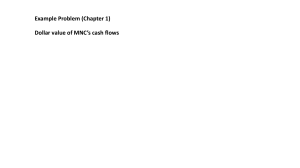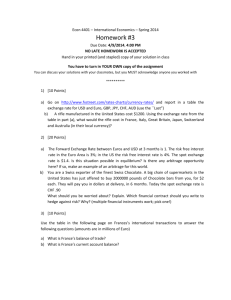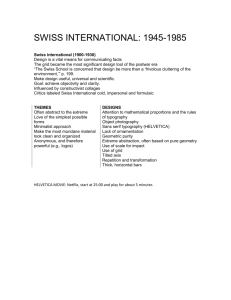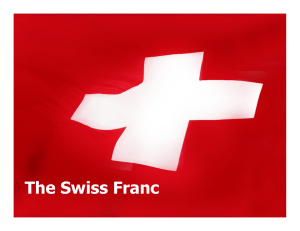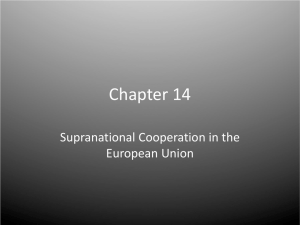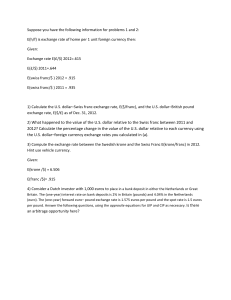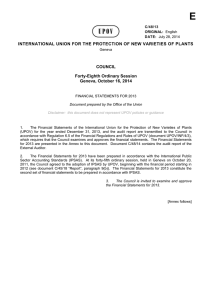Depositors Fleeing Euro Get Negative Rates at State Street Bank
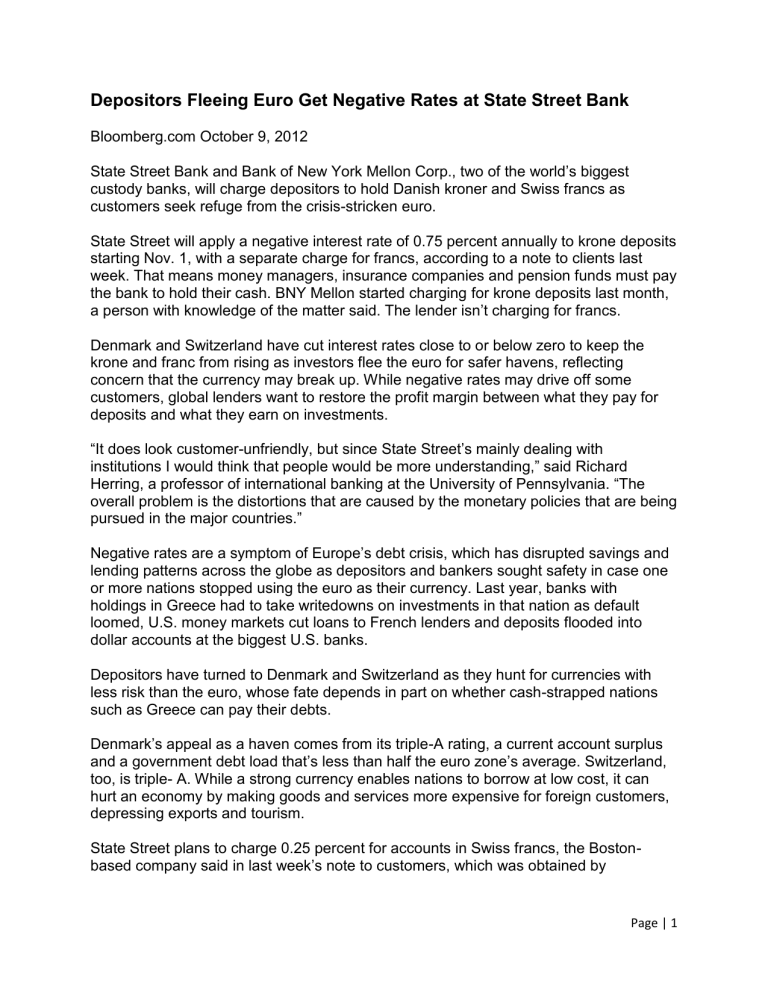
Depositors Fleeing Euro Get Negative Rates at State Street Bank
Bloomberg.com October 9, 2012
State Street Bank and Bank of New York Mellon Corp., two of the world’s biggest custody banks, will charge depositors to hold Danish kroner and Swiss francs as customers seek refuge from the crisis-stricken euro.
State Street will apply a negative interest rate of 0.75 percent annually to krone deposits starting Nov. 1, with a separate charge for francs, according to a note to clients last week. That means money managers, insurance companies and pension funds must pay the bank to hold their cash. BNY Mellon started charging for krone deposits last month, a person with knowledge of the matter said. The lender isn’t charging for francs.
Denmark and Switzerland have cut interest rates close to or below zero to keep the krone and franc from rising as investors flee the euro for safer havens, reflecting concern that the currency may break up. While negative rates may drive off some customers, global lenders want to restore the profit margin between what they pay for deposits and what they earn on investments.
“It does look customer-unfriendly, but since State Street’s mainly dealing with institutions I would think that people would be more understanding,” said Richard
Herring, a professor of international banking at the University of Pennsylvania. “The overall problem is the distortions that are caused by the monetary policies that are being pursued in the major countries.”
Negative rates are a symptom of Europe’s debt crisis, which has disrupted savings and lending patterns across the globe as depositors and bankers sought safety in case one or more nations stopped using the euro as their currency. Last year, banks with holdings in Greece had to take writedowns on investments in that nation as default loomed, U.S. money markets cut loans to French lenders and deposits flooded into dollar accounts at the biggest U.S. banks.
Depositors have turned to Denmark and Switzerland as they hunt for currencies with less risk than the euro, whose fate depends in part on whether cash-strapped nations such as Greece can pay their debts.
Denma rk’s appeal as a haven comes from its triple-A rating, a current account surplus and a government debt load that’s less than half the euro zone’s average. Switzerland, too, is triple- A. While a strong currency enables nations to borrow at low cost, it can hurt an economy by making goods and services more expensive for foreign customers, depressing exports and tourism.
State Street plans to charge 0.25 percent for accounts in Swiss francs, the Bostonbased company said in last week’s note to customers, which was obtained by
Page | 1
Bloomberg News. The Swiss franc weakened after the report, according to Gareth
Berry, a foreign-exchange strategist at UBS AG in Singapore.
“We doubt the news will have a lasting weakening effect on the Swiss franc, however, given that interest rates have been negative in the interbank market for months, and those who wish to hold Swiss franc deposits for safe haven reasons are unlikely to be deterred by a 25 basis point penalty,” he wrote in an e- mailed note today.
The franc was little changed at 1.2110 per euro at 10:45 a.m. London time.
BNY Mellon is charging “an extremely small number of clients that hold Danish kroner in their accounts,” according to Kevin Heine, a bank spokesman. Heine cited negative short- term market interest r ates for the Danish krone. Heine said his company isn’t charging customers for holding Swiss francs. BNY Mellon, the world’s largest custody bank, imposed a 0.13 percent charge last year on depositors with unusually high dollar balances to help stem the influx at the New York-based firm.
The Danish central bank cut its deposit rate to negative 0.2 percent in July, and
Switzerland cut its benchmark rate to near zero in September 2011. Jean-Pierre
Danthine, a vice president with the Swiss central bank, said in June that it might impose negative interest rates “if the circumstances warrant it.”
Domestic lenders in Denmark have been weakened by the cut in the central bank’s deposit rate to below zero, because competition has forced most of them to keep paying customers a positive rate, Fitch Ratings said in September.
State Street executives overcame their reluctance to charge depositors after central bankers in the countries signaled that benchmark rates may stay low for an extended period, and as some competitors began to impose the charges, said two people with knowledge of the plan. “The industry is experiencing unprecedented market pricing behavior in these two countries, and State Street needs to ensure we continue to provide our clients with the most efficient pricing in all of the markets where they operate,” Cichon said in an e-mailed statement.
State Street is “just reflecting where the market is,” said Herring of the University of
Pennsylvania.
Interest rates have fallen below zero before. U.S. Treasury securities traded at negative yields during parts of the 1930s and 1940s, and Switzerland imposed negative interest rates in the 1970s as part of capital controls.
Still, negative rates can produce unintended consequences. That could include customers keeping large amounts of cash in vaults, taxpayers making excess prepayments in anticipation of a full refund and savers keeping cashier’s checks made out to themselves in a drawer, according to an Aug. 29 blog post by researchers at the
Federal Reserve Bank of New York.
Page | 2
